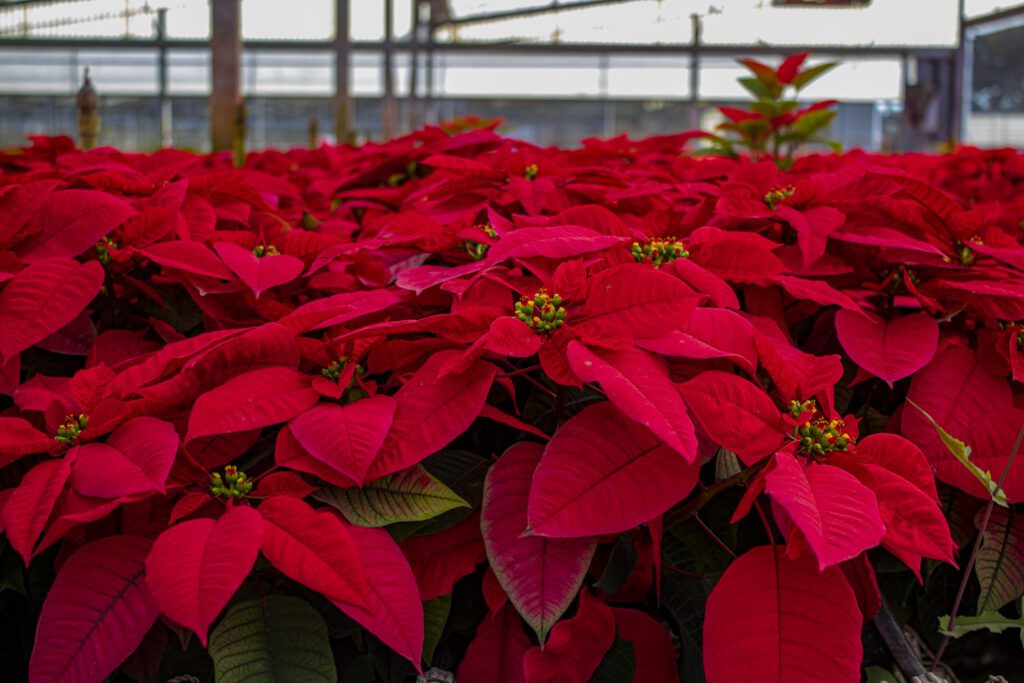Sunshine Growers’ Versatility Is Behind Record Poinsettia Crop
Walk into a Publix during the holiday season and you’ll pass a display of beautiful red and white poinsettias. If you look closer, you’ll see varieties that can’t be found anywhere else, including “Cinnamon,” with its whimsical pink and yellowish orange tint, and “Marble,” with its light-colored leaves swirled with red.
These varieties and others — grown exclusively for Publix — come from Sunshine Growers, which has grown from a single nursery in Fort Meade to multiple locations around Central Florida over the past 33 years. It has done so by using technology that has helped maintain quality standards while cutting costs and impacts.
It’s not necessarily the technology that keeps this company thriving, it’s the ability to see market trends and adapt to the changing marketplace and the desire to remain focused on growth.
Sunshine Growers President Craig Roth says he has always enjoyed plants. It’s one of the reasons he started a lawn service in junior high and maintained through high school. In 1986, at the age of 19, Roth, together with his father Lee and brother Scott — along with friend Shane Weaver — bought a nursery in Fort Meade and formed Sunshine Growers. Roth knew from the start that buying a nursery and growing what’s inside were two different things.
“I had to learn from scratch,” he says. “Fortunately, I had people that helped along the way.”
One of the key helpers was the former owner of the nursery, who, for the next year, came down once a month from Tennessee to answer questions, provide on-site service and help.
“I also talked to other local growers who would provide insights,” says Roth, “and I hired some good growers.”
Through the process, Sunshine Growers began to expand. From the initial 60,000 square-foot facility, the company has grown to as high as 1 million square feet in multiple locations. It currently maintains 120,000 square feet of greenhouse, 400,000 square feet of shade house and about six acres of outside growth.
From the beginning, Sunshine Growers has focused on ways to improve plant productivity as well as conserving resources.
“One of the things we learned early on was that we needed to work differently,” Roth says. “The Fort Meade location used an overhead irrigation system that was using millions of gallons of water a month. That was not sustainable.”
They switched to a tape irrigation system, which drips water and fertilizer director into the pot, which immediately saved 2 million gallons of water a month. Since the water went directly into the pot, the move also saved fertilizer and spraying the fungus.
“Cutting the water costs as well as cutting down on fungus issues was a win-win for us,” says Roth. “Plus, it’s an easy system to manage.”
Roth says there have been a lot of “simple things” the company has done. For example, the company has developed boxes that do not need to be taped, cutting tape costs. Instead of printing labels, the company has moved to a system that prints directly onto the boxes, saving time and money.
“We have, over time, figured out the best way to maintain size consistently for each variety of plants we grow,” Roth says.
Nothing exemplifies that any more than this year’s poinsettias crop, which overcame a hot September to grow into one of the company’s best in its history.
“I’d say it’s an overall phenomenal crop for us,” he says. “It’s one of the top years as far as color, size, and sales. We are very thankful that in a year where you have a lot of heat we were able to see this result.”
On top of that, says Roth, it’s a shorter selling season for the plant. With Thanksgiving coming so late, the poinsettia-selling season went from the usual five weeks down to three.
That Sunshine Growers was able to thrive in this shortened selling season speaks to something else Roth has been able to thrive in: the changing way nurseries do business.
“A lot of nurseries used to operate on speculation, but it’s a much tighter market now,” Roth explains. “I don’t speculate more than I’ve presold.”
This new norm has caught some people off guard, especially in a time when some of the smaller nurseries are going out of business. Not planning ahead, he says, may leave some buyers with nothing to buy.
“We’ve seen it this season more than ever,” he says. “If they didn’t plan ahead and just assumed the product would be there, they were out of luck.”
Each plant takes up space and a grower has to plan that space with known quantities, not speculations, Roth says. “With our margins so slim, you can’t assume you’re going to sell based on speculation.”
As the market fluctuates, Sunshine Growers is also looking ahead to new trends in the business, especially one that is green and leafy.
“What’s next for Florida is hemp production,” says Roth. “Medical marijuana is here and we’re involved in helping hemp starter plants that can be started in our facilities and then grown by farmers.”
The company made two hemp-related moves in 2019. In April, the company sold a 32-acre facility to Surterra Wellness, one of 14 companies licensed to produce medical marijuana in Florida.
In October, the company sold a 30-acre nursery to GreenPoint Research, a Colorado-based company that operates one of the largest hemp-dedicated nurseries in the country. Roth stayed on with GreenPoint through the lease agreement, during which time Sunshine Growers is still able to grow some flowers, vegetables and other outdoor plants. Shane Weaver, one of the founders of Sunshine Growers, is now facilities manager for Surterra Lakeland, LLC.
“There’s a whole new market out there,” says Roth. “There’s a lot on the horizon, and you have to be able to adapt to that in this industry.”

